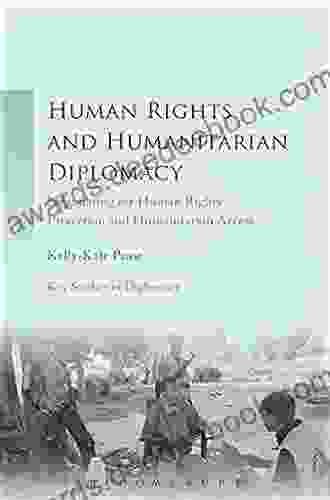Negotiating for Human Rights Protection and Humanitarian Access: Key Studies

Negotiation is a critical tool for protecting human rights and ensuring humanitarian access in conflict and post-conflict settings. Through negotiation, parties to a conflict can reach agreements that can prevent or mitigate human rights violations, provide access to essential services, and facilitate the delivery of humanitarian aid.
4.7 out of 5
| Language | : | English |
| File size | : | 3997 KB |
| Text-to-Speech | : | Enabled |
| Screen Reader | : | Supported |
| Enhanced typesetting | : | Enabled |
| Word Wise | : | Enabled |
| Print length | : | 316 pages |
However, negotiating for human rights protection and humanitarian access is a complex and challenging process. Parties to a conflict often have different and competing interests, and there are often significant power imbalances between them. As a result, it is important to approach negotiations with a clear understanding of the challenges and opportunities involved.
Challenges to Negotiating for Human Rights Protection and Humanitarian Access
There are a number of challenges that can make negotiating for human rights protection and humanitarian access difficult. These challenges include:
- Lack of political will: Parties to a conflict may not have the political will to negotiate for human rights protection and humanitarian access. This may be due to a lack of understanding of the importance of these issues, or to a desire to maintain control over the population.
- Power imbalances: Parties to a conflict often have different levels of power. This can make it difficult for weaker parties to negotiate for their rights.
- Lack of trust: Parties to a conflict may not trust each other. This can make it difficult to build the relationships that are necessary for successful negotiation.
- Violence: Negotiations may be disrupted or even prevented by violence. This can make it difficult to create a safe and conducive environment for dialogue.
Opportunities for Negotiating for Human Rights Protection and Humanitarian Access
Despite the challenges, there are also a number of opportunities for negotiating for human rights protection and humanitarian access. These opportunities include:
- International law and norms: There is a strong body of international law and norms that support human rights protection and humanitarian access. This can provide a basis for negotiations and can help to create pressure on parties to a conflict to comply with their obligations.
- Humanitarian actors: Humanitarian organizations can play a vital role in facilitating negotiations for human rights protection and humanitarian access. They can provide technical expertise, advocacy, and support to parties to a conflict.
- Local communities: Local communities can also play a role in negotiating for human rights protection and humanitarian access. They can provide information about the needs of the population and can help to build trust between parties to a conflict.
Key Studies in Negotiating for Human Rights Protection and Humanitarian Access
There have been a number of successful negotiations for human rights protection and humanitarian access in conflict and post-conflict settings. These negotiations have varied in their scope and complexity, but they all share some common elements.
One of the most important elements of successful negotiations is a clear understanding of the context in which they are taking place. This includes an understanding of the history of the conflict, the political and military situation, and the needs of the population.
It is also important to develop a clear strategy for negotiations. This strategy should include a set of objectives, as well as a plan for achieving those objectives. It is also important to be prepared to compromise and to be flexible in order to reach an agreement.
Finally, it is important to build relationships with the other parties to the negotiation. This can be done through informal meetings, workshops, and other activities. Building relationships can help to create trust and can make it more likely that the negotiations will be successful.
The following are some key case studies in negotiating for human rights protection and humanitarian access:
- The Dayton Accords: The Dayton Accords were a peace agreement that ended the Bosnian War in 1995. The negotiations were facilitated by the United States and the European Union, and they resulted in an agreement that protected the human rights of all parties to the conflict and provided for humanitarian access to the population.
- The Comprehensive Peace Agreement: The Comprehensive Peace Agreement was a peace agreement that ended the Sudanese civil war in 2005. The negotiations were facilitated by the United Nations and the African Union, and they resulted in an agreement that protected the human rights of all parties to the conflict and provided for humanitarian access to the population.
- The Geneva Conventions: The Geneva Conventions are a set of international treaties that protect the rights of civilians and prisoners of war during armed conflict. The conventions were negotiated in the aftermath of World War II, and they have been ratified by over 190 countries.
Negotiation is a critical tool for protecting human rights and ensuring humanitarian access in conflict and post-conflict settings. However, negotiating for these issues is a complex and challenging process. By understanding the challenges and opportunities involved, and by following some basic principles, it is possible to increase the chances of successful negotiation.
4.7 out of 5
| Language | : | English |
| File size | : | 3997 KB |
| Text-to-Speech | : | Enabled |
| Screen Reader | : | Supported |
| Enhanced typesetting | : | Enabled |
| Word Wise | : | Enabled |
| Print length | : | 316 pages |
Do you want to contribute by writing guest posts on this blog?
Please contact us and send us a resume of previous articles that you have written.
 Novel
Novel Page
Page Text
Text Genre
Genre Library
Library Paragraph
Paragraph Glossary
Glossary Bibliography
Bibliography Preface
Preface Footnote
Footnote Manuscript
Manuscript Tome
Tome Classics
Classics Library card
Library card Narrative
Narrative Biography
Biography Autobiography
Autobiography Encyclopedia
Encyclopedia Dictionary
Dictionary Thesaurus
Thesaurus Narrator
Narrator Character
Character Resolution
Resolution Catalog
Catalog Card Catalog
Card Catalog Stacks
Stacks Archives
Archives Periodicals
Periodicals Scholarly
Scholarly Reserve
Reserve Academic
Academic Journals
Journals Rare Books
Rare Books Special Collections
Special Collections Literacy
Literacy Study Group
Study Group Thesis
Thesis Dissertation
Dissertation Awards
Awards Reading List
Reading List Kelly Flanagan
Kelly Flanagan Witold Szablowski
Witold Szablowski Shira Evans
Shira Evans Andreas Botsikas
Andreas Botsikas Jerzy J Wiatr
Jerzy J Wiatr Jeremy Schroeder
Jeremy Schroeder L C Kincaide
L C Kincaide Miranda Dickinson
Miranda Dickinson Liz Fe Lifestyle
Liz Fe Lifestyle James Collins
James Collins Kelly Tully
Kelly Tully Dominik Wexenberger
Dominik Wexenberger Amber Mcnaught
Amber Mcnaught Scott Su
Scott Su Robin Sharma
Robin Sharma Liz Wu
Liz Wu S D Nelson
S D Nelson Timothy Janovsky
Timothy Janovsky 1st Edition Kindle Edition
1st Edition Kindle Edition Tom Mungovan
Tom Mungovan
Light bulbAdvertise smarter! Our strategic ad space ensures maximum exposure. Reserve your spot today!
 Heath PowellFollow ·16.3k
Heath PowellFollow ·16.3k Elton HayesFollow ·14.9k
Elton HayesFollow ·14.9k Drew BellFollow ·3.6k
Drew BellFollow ·3.6k Isaias BlairFollow ·7.1k
Isaias BlairFollow ·7.1k Ivan CoxFollow ·12.9k
Ivan CoxFollow ·12.9k Josh CarterFollow ·16.1k
Josh CarterFollow ·16.1k Mason PowellFollow ·10.8k
Mason PowellFollow ·10.8k Chinua AchebeFollow ·16.4k
Chinua AchebeFollow ·16.4k

 Roger Turner
Roger TurnerThe Waning of the Individual in the Global Era: A...
In the rapidly globalizing world of today,...

 Reginald Cox
Reginald CoxFirst of Verbs: An Early Language
The First of Verbs (FOV) is an early...

 Cody Blair
Cody BlairThe Biography Of The Myth: Routledge Historical...
Who is the Myth?...

 Dean Cox
Dean CoxArtificial Neural Networks: Unraveling the Amazing...
Artificial Neural Networks (ANNs),...

 Kyle Powell
Kyle PowellHow To Amend Our Constitution To Rescue Democracy For All...
Our democracy is in...
4.7 out of 5
| Language | : | English |
| File size | : | 3997 KB |
| Text-to-Speech | : | Enabled |
| Screen Reader | : | Supported |
| Enhanced typesetting | : | Enabled |
| Word Wise | : | Enabled |
| Print length | : | 316 pages |














